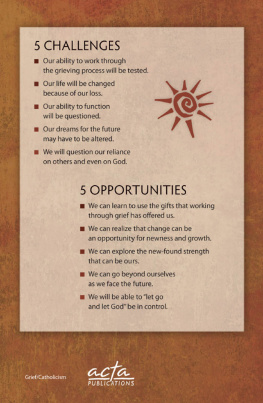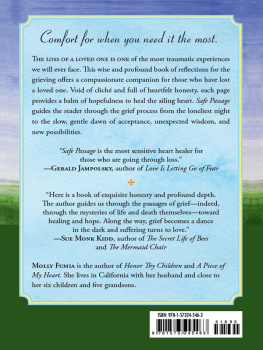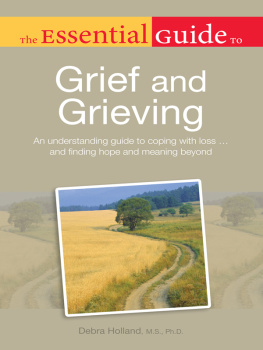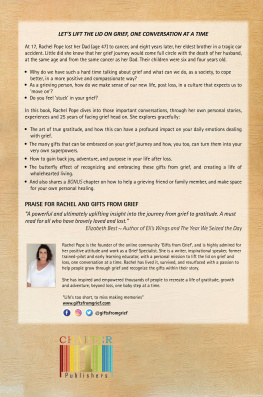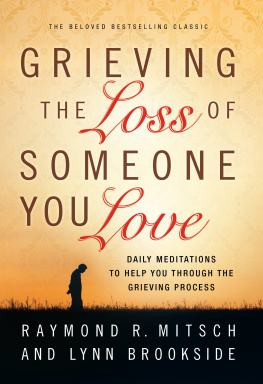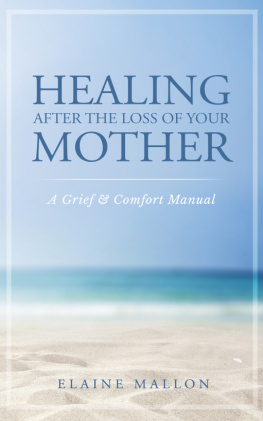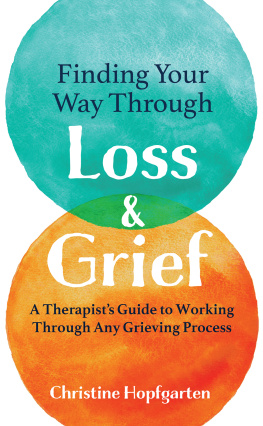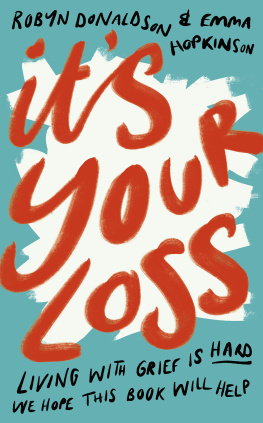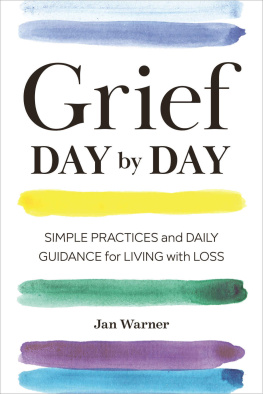
CATHOLIC & MOURNING A LOSS
5 CHALLENGES AND 5 OPPORTUNITIES
by Mauryeen OBrien, OP
Edited by Gregory F. Augustine Pierce
Cover and text design and typesetting by Patricia A. Lynch
Cover photo courtesy of Bigstock
Scripture taken from The Message. Copyright 1993, 1994, 1995, 1996, 2000, 2001, 2002. Used by permission of NavPress Publishing Group.
Copyright 2014 by Maureen OBrien
Published by ACTA Publications, 4848 N. Clark Street, Chicago, IL 60640, (800) 397-2282, www.actapublications.com
All rights reserved. No part of this publication may be reproduced or transmitted in any form or by any means, electronic or mechanical, including photocopying and recording, or by any information storage and retrieval system, including the Internet, without permission from the publisher. Permission is hereby given to use short excerpts or pieces of art with proper citation in reviews and marketing copy, church bulletins and handouts, and scholarly papers.
CONTENTS
DEDICATION
To all who have reached out to those who mourn. You are, indeed, among Gods chosen ones.
When we human beings have suffered a loss of any kind, we expect to go through a grieving process of some duration, depending on the nature and intensity of the event. It is part of our nature to mourn what we have loved.
Our grief may be caused by the death or sudden absence of a spouse, child, parent or sibling, friend, relative, or other loved one; or a colleague at work, companion in some activity, neighbor, member of a church or organization, or other acquaintance; or even a dog, cat, or other beloved pet. It could entail the loss of a job, home, financial security, health, youth, reputation, memory, lifelong dream, or prized possession. It could even be the loss of something or someone in the public arena that meant a lot to us.
Here is the reality: Unless we mourn that loss sufficiently and successfully, we will not be able to move on with our life and live it to its fullest. Our mourning can have no self-imposed time limit; it will not proceed logically or step by step; and it may surround us over and over again. There is no way around our grief. We cannot go over it or under it or around it; we must work through it, and that may be the hardest work we ever attempt.
What can help us navigate our grief journey? There are innumerable therapists, support groups, books, movies, music and lectures available. There are experienced church personnel, family, and friends who are willing to listen to and support us as we try to make some sense of what has happened. We should make use of as many of these resources as are helpful.
But we may ask ourselves: Where is God in what I am going through? We may temporarily lose our sense of Gods presence in the throes of our grief: Why does God allow such pain and suffering? These are questions for which we try to find answers over and over again throughout our life. We may even find it difficult at times to pray; it may seem we are only able to cry and be angry and be in pain. Trusting in Gods power and ability to intervene in our life may be a very difficult thing for us to do at these times.
However, precisely because our loss, no matter what its nature, is forcing us to assess our spiritual life, the act of struggling with our grief can actually help us experience the presence of a loving God in an even stronger way. And our Catholic faith, with its strong emphasis on forgiveness and healing and prayer, can help that happen.
We Catholics believe Jesus taught us that God, whom he experienced as a loving Father, wants only good things for us. We believe Jesus showed us by his own example how to accept and overcome sorrow and loss, even the most unjust. And we believe Jesus never judges or abandons us as we struggle with our grief.
Catholic prayer and ritual can therefore be an important element of the healing process. They provide a framework of faith for us to overcome our sadness and anger through the use of repetition and familiarity. They allow us to express our deepest thoughts and feelings about loss and death. In times of grief they can bring us a sense of balance and peace. They give us a way to say goodbye, to express our pain, to adjust to transitions, to remember treasured times and people and things that have brought beauty and meaning to our life. They help connect us with our past, define our present, and show us a path to the future.
Certainly we all need to rely on faith and trust in God if we are to embrace the healing that can take place after experiencing a loss of any kind. Our Catholic faith prompts us to understand that life is not just happy or just sad; it is a combination of the two. Our faith can help us begin to realize that even though loss always produces suffering and pain, we can recover from it and move on with life. We need only look at the happenings in Christs life here on earth from Good Friday to Easter Sunday to realize that out of suffering can come great joy and the promise of new life.
Mourning a loss has its challenges. When we grieve we become extremely vulnerable. We stand with open, raw wounds in need of healing and compassion. We wonder if we are strong enough to meet the tasks before us. How can I ever heal? we may say. How can I begin to live a new life when the life I have been living, which was so happy and full, has been lost forever?
In my work over decades with people like you, dear reader, who have suffered a loss, I have found that facing head-on the challenges of mourning is really the only way to move successfully through the grieving process. You will be challenged; there is no doubt about that. But with each challenge there will arise an opportunity to grow stronger as you struggle to face the changes that inevitably come because of every sorrow you endure.
Our ability to work through the grieving process will be tested.
Someone once said that the work of grieving is the hardest work we ever do. There are many things we have to face when we have lost someone or something that enriched our lifeemotions we must look at, some we might never have experienced before.

Madeline, a seventy-four-year-old lady I work with as a grief counselor, confided to me that she had never really been an angry person. She found little to be angry aboutuntil, that is, her landlord told her she had to get rid of her dog because it barked too much and disturbed the neighbors.
I found myself furious with him, she told me. How dare he try to take away my Toby when he was all I had left after my husband died? Her realization that she could get so angry was new for her, and she didnt like the feeling. She and I discussed at length that the loss of her dog was part of her grieving the death of her husband and that it added to her feeling of abandonment. Im not sure I can work through this grieving process, she said. Its too hard, and Im not strong enough to handle it anymore.
My friend was questioning her ability to be able to face the sense of sorrow and loss she was going through. It was hard work, and she was tired and sad and lonely.

I was downsized last month in a job I had held for fifteen years, a man named Jack said to me one day. I loved my job and did it well. I even received commendations from my supervisor. People often remarked that the company would never have grown as it did if it wasnt for me and the work that I did. And then, out of the blue, I was let go! Now, I dont know what to do. That job was my whole life. I almost feel there is nothing to live for, nowhere to go. I know I have to mourn the loss of my job, but I cant face working through the whole grief thing.
Next page
